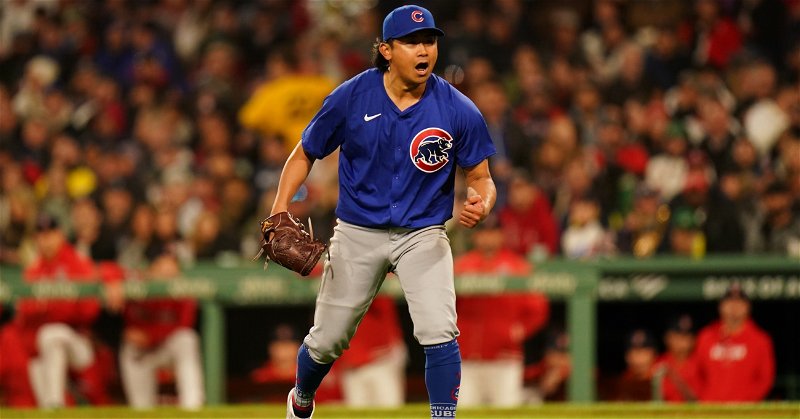
Should Cubs have let Imanaga try for a no-hitter? |
It was a historic day at Wrigley Field on Wednesday as Shōta Imanaga, Nate Pearson, and Porter Hodge combined to throw the first Cubs no-hitter at Wrigley Field since Milt Papas’ no-no in 1972.
It was the Cubs’ first no-hitter since their combined no-hitter in 2021, their second combined no-hitter in franchise history, and their 18th overall. The no-hitter marked the first at Wrigley Field altogether since 2015 when Cole Hamels threw one against the Cubs as a member of the Phillies. Imanaga shouldered most of the load, tossing seven no-hit innings, walking two, and striking out seven. He exited with 95 pitches. Imanaga pitched around three errors by third baseman Isaac Parades, which drove his pitch count higher. Former Blue Jay Nate Pearson and rookie Porter Hodge were called on to pitch the 8th and 9th innings, respectively, and each of them tossed perfect 1-2-3 frames to secure the no-hitter. It seemed like only the Cubs’ dugout knew the status of the situation. When Cubs manager Craig Counsell approached Imanaga after the seventh inning to tell him his evening was over, Imanaga didn’t understand why he was being talked to that way — he didn’t know he hadn’t allowed a hit. When Pearson was called on to pitch the 8th, he didn’t even know that he was protecting a no-hitter. Only Porter Hodge, who saw on the TV screen in the bullpen while warming up, knew the gravity of the ballgame he was entering. In 2010, Edwin Jackson tossed a 140-pitch no-hitter for the Diamondbacks, and it just goes to show you how far baseball has come in that regard. However, it also begs two questions. Do combined no-hitters hold less weight than solo efforts? Should the Cubs have left Imanaga in to complete history on his own? Imanaga is enjoying a wildly successful rookie season in MLB. The 30-year-old is 12-3 with a 2.99 ERA. It makes sense why the Cubs wanted to pull him. They’re simply trying to preserve the health of one of the most important players in their organization — especially a day after the news came out that their other ace, Justin Steele, was heading to the injured list with elbow tendinitis. Plus, despite the Cubs’ odds of making the playoffs being below 5% — the Cubs are still in a playoff race, so if the Cubs have any hopes of making the playoffs, Imanaga needs to be a part of that. But we’ve seen pitchers throw 120 or 140 pitches, and their arms don’t explode. We’ve also seen bullpen pitchers who pitch no more than 20 pitches get injured. While the analytics show a pitcher’s effectiveness goes down the more pitches he throws — and hint that if a pitcher repeatedly throws 100s of pitches, he is more likely to suffer an arm injury, it doesn’t guarantee that an injury would occur with his 101st pitch. We’ve also seen pitchers get hurt in hotel rooms, while flying drones, warming up, and even punching walls. Every athlete takes a risk when they take the field, and that risk includes the repercussions of putting their bodies on the line. There’s no knowing if Imanaga would have allowed a hit in the 8th or the 9th inning — or if he would have been able to get out of each inning with low stress. There’s also no way to know if he would’ve suffered an injury in those last two innings. Plus, what if Paredes didn’t make those errors? Imanaga may have had 85 pitches or 80 after seven innings. Could he have completed the no-hitter then? Who knows? Luckily, Pearson and Hodge did their job, and all three can now say they’ve pitched a no-hitter. But I’m sure we all would’ve liked seeing Imanaga out there.





